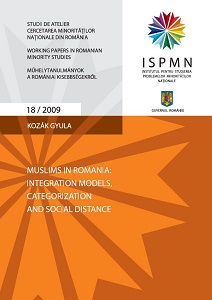Muslims in Romania: Integration Models, Categorization and Social Distance
Muslims in Romania: Integration Models, Categorization and Social Distance
Author(s): Gyula Kozák
Subject(s): Islam studies, Migration Studies, Inter-Ethnic Relations, Ethnic Minorities Studies, Identity of Collectives
Published by: ISPMN Institutul pentru Studierea Problemelor Minorităţilor Naţionale
Keywords: Muslims in Romania; ethno-religious identity; Media representation; Islamic fundamentalism; migrants;
Summary/Abstract: The paper takes a stance toward acknowledging social distance as a prerequisite of incorporation, but it also argues that immigrants can be used as the "other" for debating "indigenous" identities, loyalties, and affiliations. More precisely, the paper looks on the struggle between different proponents of Islamic religious practice as they construct the "other" and themselves in a shifting landscape of global meanings regarding Islam. When associated with the 'indigenous', the presence of the immigrants can bring to the fore internal tensions of an ethnic community and force its members to redefine their ethnic allegiances, or establish different degrees or kinds of ethnic, regional or religious 'cultural content'. This is the case especially when a quasi standardized global discourse is at hand and different models of institutional integration pertain to different categories of Muslims. The paper describes two models of integration and two systems of categorization that these models engender.
Series: STUDII DE ATELIER. CERCETAREA MINORITĂŢILOR NAŢIONALE DIN ROMÂNIA
- Page Count: 25
- Publication Year: 2009
- Language: English
- Content File-PDF

